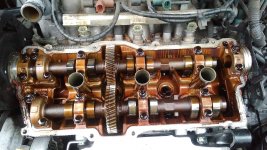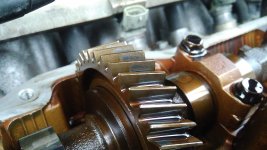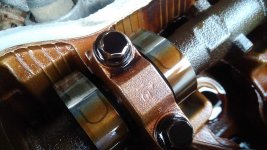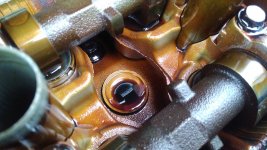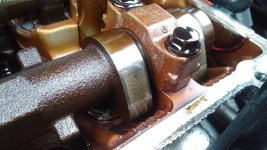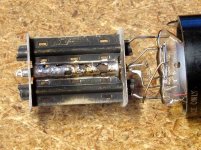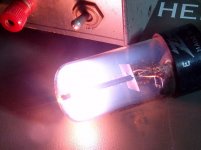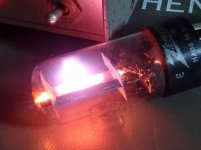The method used in the test doesn't represent real world engine conditions by a long shot. What is interesting though, it is a consistent methodology used, and the results vary quite significantly. For that particular testing methodology there are big differences between the different oils tested, and the results (at least of the wear test) are as far as I can see objective.
So if you look at it from a worst case scenario, the higher rated oils should offer more protection than the lower rated oils. Whether or not it makes any difference at all in the real world however is the main question I doubt you can go wrong using a better rated oil though.
I doubt you can go wrong using a better rated oil though.
I know from years ago with my Pug the dealer was putting some sort of std mineral Valvoline oil in it (something like a 20W-40) I had quite high oil consumption (probably in the vicinity of 1L every 2500 KM). I changed to Mobil 1 (I think it was probably 10W-50) and oil consumption went down to less than 1L every 7500KM.
I've been running synthetic or semi synthetic oils in it since, and still at around 1L / 5000KM and I suspect most of that is leaking past the main seal, which is a bit worn at 260,000+KM.
Tony.
So if you look at it from a worst case scenario, the higher rated oils should offer more protection than the lower rated oils. Whether or not it makes any difference at all in the real world however is the main question
I know from years ago with my Pug the dealer was putting some sort of std mineral Valvoline oil in it (something like a 20W-40) I had quite high oil consumption (probably in the vicinity of 1L every 2500 KM). I changed to Mobil 1 (I think it was probably 10W-50) and oil consumption went down to less than 1L every 7500KM.
I've been running synthetic or semi synthetic oils in it since, and still at around 1L / 5000KM and I suspect most of that is leaking past the main seal, which is a bit worn at 260,000+KM.
Tony.
Last edited:
A buddy of mine had a Nissan Maxima that was purchased new, he never changed the oil, just added when needed.
It finally died after 166K.
Also, the junkyards are full of decent engines in otherwise worn out cars I have noticed.
I tend to drive my cars rather hard, so if I notice a performance increase from a certain weight or brand of oil, I will gravitate towards using that if it isn’t overly expensive. Certain weights will aid in sealing the rings, helping compression. I can see how the die hard by the book engineers would state that the engine was built to perform in a certain manner and that’s the way it is, however.
If you want to discuss some additives, some have shown to work at adding power, sounds like snake oil, but...
It finally died after 166K.
Also, the junkyards are full of decent engines in otherwise worn out cars I have noticed.
I tend to drive my cars rather hard, so if I notice a performance increase from a certain weight or brand of oil, I will gravitate towards using that if it isn’t overly expensive. Certain weights will aid in sealing the rings, helping compression. I can see how the die hard by the book engineers would state that the engine was built to perform in a certain manner and that’s the way it is, however.
If you want to discuss some additives, some have shown to work at adding power, sounds like snake oil, but...
I once ca 10 years ago did buy a fully synthetic 5W40 of a lesser brand and my car which has quite many kilometers behind started to smoke and did also smell badly, I changed it the next day to a known brand and the bad smelling smoke was gone, not going to save few Euros on oil which is changed maybe only ones a year.
If it only smokes on startup then it sounds like your valve stem seals are done for. Difficult but not a disastrous thing to happen to an engine.
If it does it continuously it could be that the oil is leaking past your piston rings. A leakdown test would be advisable but its not likely that you still have the car after 10 years. If its doing it continuously it could also be a bad PCV valve, the springs in them go soft over time and they will suck up oil into the intake manifold like a hobo sucking on a straw in a bowl of melted butter.
A fully synthetic oil will find all of the leaks in your engine and expose them, the reason why this is so is because a full synthetic will flow quicker to an area and lubricate that area whereas a mineral oil wont. As you can see in this video: YouTube
Generally its a good idea that if you have a high mileage engine that is in good shape and are going to switch to a synthetic-mix or a fully synthetic oil that you have all of the seals replaced on your engine first.
Its probably not worth it switching over to a synthetic if your engine is already worn as you probably aren't going to replace those seals anyway and it will just keep on leaking until it runs out of oil, probably best to then stick to a mineral oil.
Note that synthetic oils don't cause leaks they just expose the leaks that were there already and hidden from sight by the mineral oil not doing such a good job at getting into those areas.
if you want to keep on using synthetics a stop leak fluid should make those seals swell up and stop the leaks.
Last edited:
Here is some eye candy for you oil fiends out there. A 350,000km (217,479mi) Toyota Camry Vienta V6 3VZ-FE engine with regular oil changes its whole life. No idea what sort of oil was used but I can contact the mechanic who did it and ask. These pics were taken from when I replaced the forward bank tappet cover gasket. My mechanic did the rear one for me.
There is no scoring that I can see. Just the brand new ceramic coating that is put on cam lobes.
There is no scoring that I can see. Just the brand new ceramic coating that is put on cam lobes.
Attachments
Last edited:
So if you look at it from a worst case scenario, the higher rated oils should offer more protection than the lower rated oils. Whether or not it makes any difference at all in the real world however is the main questionI doubt you can go wrong using a better rated oil though.
I know from years ago with my Pug the dealer was putting some sort of std mineral Valvoline oil in it (something like a 20W-40) I had quite high oil consumption (probably in the vicinity of 1L every 2500 KM). I changed to Mobil 1 (I think it was probably 10W-50) and oil consumption went down to less than 1L every 7500KM.
I've been running synthetic or semi synthetic oils in it since, and still at around 1L / 5000KM and I suspect most of that is leaking past the main seal, which is a bit worn at 260,000+KM.
Tony.
First off lets make a definition between an oil leak and "oil consumption". Oil consumption is typically used for when your piston rings are so worn out that the oil leaks past them and burns in the combustion chamber. For this I would recommend Penrite HPR10 10w50. The only reason why I suggest a brand name here is because the Penrite 10w50 is the easiest to find and is the one most likely on sale.
What you are describing however is a gasket leak. So you will need to either fix the gasket by getting it replaced by a mechanic or use oil stop leak to make the gasket swell up and stop the leak. Then you can use a 5w40 or 10w40 oil. This will improve fuel economy and power output.
You should never go above 10w40 ever. The only time 50 weight is ever called for is in an engine which has been severely abused to the point that you have severely worn out piston rings and blow smoke if you were to use any lighter oil and you have noisy lifters which aren't getting lubrication.
A 50 weight oil consumes more energy to pump it around and as a result will put strain on your oil pump. In addition to this your engine will run hotter because its working harder to move your car around than it would with a lighter weight oil. As a result of this you will lose power by going to a 50 weight oil. I've tried driving a car up a hill with 20w50 and its atrociously underpowered.
So fix the oil leak by replacing the seal and use a 10w40 and you will be fine.
I've owned at least 6-7 cars in my time and I have tried every oil from 10w30 to 10w50, 15w40 and 20w50. You won't gain any additional wear protection by bumping the oil viscosity up to 50 weight if you are already using a 40 weight oil but you will if you are running the factory recommended 30 weight oil and go from 30 weight to 40 weight. 50 weight is just overkill period.
The protection that an oil provides is highly determined by the ambient temperature outside of your car. if you are in a cold climate then use a lighter oil, but if you're in Australia and its hot in your area then you should be using a heavier weight. I would have to go out into the middle of Australia and get into a region where it gets to the low 50 deg c temperatures with my aircon on while towing a trailer to consider using a 50 weight oil. And EVEN THEN I would still use a 10w50 oil.
40 weight oil is the perfect figure for cars in Australia.
5w40 is perfect if you live in a city or suburban area.
10w40 is perfect if you live in a suburban or mostly highway area.
15w40 is also perfect for mostly highway use with a little suburban driving.
If you live in an area where there is a street light every few km, then go with 5w40 or 10w40, the reason for this being is that you want your engine oil to warm up as quickly as possible because you are stopping and starting.
Fix the oil leak, that is the best thing you should do to protect your engine because if the oil level goes below that crosshatch pattern on your dipstick even once then its starving for oil.
Last edited:
Meets North American warranty requirements for U.S., European and Japanese cars and light trucks with gasoline and gasoline turbo-charged engines where API SN and earlier API categories are specified.
The above is the label printed on all brands of oil, from inexpensive store brands to high priced synthetics.
The engine oil that works best for me is whatever is on sale.
The above is the label printed on all brands of oil, from inexpensive store brands to high priced synthetics.
The engine oil that works best for me is whatever is on sale.
The above is the label printed on all brands of oil, from inexpensive store brands to high priced synthetics.
The engine oil that works best for me is whatever is on sale.
The Bi Lo branded oil is like that too and I've used it and its fine. It was a tad thinner than the same weight of oil from a different brand though but it worked fine. But I've tried Nulon oil and it gave me noisy lifters despite being the exact same weight oil as the previous brand that I used. The noisy lifter symptom never went away until I got the oil out.
If you want to use whatever brand of oil is cheapest at the time then do so.
I've bought these brands over the years:
BiLo
Nulon
Penrite
Mobil 1
Valvoline
Caltex
Shell
Only reason why I'm going with a Mobil 1 Super 2000 X1/X2 oil the next change is because I want to see if there is any added benefits to this testing that the youtube channel "Piotr Tester" has done. I'm not paying more for the oil if anything I'm getting it cheaply at $33 AUD a bottle. So there is nothing "snake oil" about it and my last 5 Liters of oil cost me $13, was Caltex Magantec stop start.
If it works it works. Its not like I can scientifically test the engine in another 350,000km and compare the oil with another brand in another engine.
So I'm switching brands because:
#1 I'm not attached to any one brand.
#2 The Mobil 1 oil is on sale.
#3 My camry needs an oil change.
#4 Circumstantial evidence of some form of benefit that I can never hope to ever prove.
Last edited:
I have never purchased a new car, I do not enjoy driving enough to warrant the expense.
I have always purchased good used vehicles and drove them into the ground.
When the scrapman cometh, it was never because of engine problems, they still ran perfectly.
This thread is turning again into a who can copy and paste the most contest. (grin)
I have always purchased good used vehicles and drove them into the ground.
When the scrapman cometh, it was never because of engine problems, they still ran perfectly.
This thread is turning again into a who can copy and paste the most contest. (grin)
There is a factory near here that "makes" motor oil. I know a few people who work there, I also interviewed for a job there, but didn't get hired (too old).
They get refined base oil stock in by the barge or tanker truck load. Then mix in the additive package provided or specified by the company that owns the brand label that will go on the bottle. The blend is then bottled, boxed, and palletized, and shipped out by truck.
This same plant makes everything from Walmart's house brand to several gas station brands (I think Shell is one), to a couple of major label brands.
So, indeed there isn't a big difference as to what's in the bottle.
The base lubricant in conventional oil used to be paraffin, that is being reduced, but I haven't kept up with the latest performance engine tech and a LOT has changed since I used to race cars.
The base lubricant in synthetic oil is a custom "long chain polymer" that withstands much higher temperatures before the chain breaks and the viscosity begins to thin. The only synthetic I ever used was Mobil 1 since that's what I was told to use by someone who knew a lot more about tweaking the Chrysler 2.2 Liter motor than I did, Carroll Shelby. It was also required for warranty coverage on the 90's Dodge Viper and the Z-06 Corvettes.
I did notice that conventional oil would get thinner inside the extremely hot turbocharger, allowing some oil to squeeze through the bushing and into the intake system, particularly in a worn turbo. This can be evidenced by a thin coating in the intercooler, and a small amount of white smoke out the exhaust on deceleration. The characteristic smell of burning engine oil could be detected. Engine oil can cause detonation, which would be detected by the knock sensor causing an immediate reduction in ignition timing, boost or both.
The car could be abused a bit harder before triggering knock sensor induced power loss on synthetic oil. Synthetic oil also has a burning plastic smell when you do manage to fry it.
I still use Mobil 1 in both my cars, based on my experiences about 30 years ago, but any quality brand of motor oil should be fine in a car that is not abused or raced.
For the first 15 years or so of my driving history I would by a $200 car, drive it until it died, then repeat. Oil change.....never, just keep a bottle in the trunk and add it when the oil light blinked on hard cornering. The old slant 6 Chrysler (before 1974) engines would take this abuse for up to 200,000 miles! In the salty humid air of south Florida the body would rust off of the car before the powertrain would die. I had a 1965 Dodge Dart that I would floor in Neutral then drop into Drive.....Never broke anything. I gave it to my younger brother, who couldn't kill it either.....he sold it at 170,000 miles.
Don't try this on a modern engine. Many OHC engines have the camshafts running directly on machined surfaces in the cylinder head with no bearings (including the 2.2 L Chryslers that I used to race). Dirty oil will eventually clog the oil filter activating its bypass. Then the crud that should have been caught in the oil filter will cause camshaft seizure or clog an oil passage somewhere fun, like the timing chain squirter on a Chevy V6, causing some expensive parts breakage.
They get refined base oil stock in by the barge or tanker truck load. Then mix in the additive package provided or specified by the company that owns the brand label that will go on the bottle. The blend is then bottled, boxed, and palletized, and shipped out by truck.
This same plant makes everything from Walmart's house brand to several gas station brands (I think Shell is one), to a couple of major label brands.
So, indeed there isn't a big difference as to what's in the bottle.
The base lubricant in conventional oil used to be paraffin, that is being reduced, but I haven't kept up with the latest performance engine tech and a LOT has changed since I used to race cars.
The base lubricant in synthetic oil is a custom "long chain polymer" that withstands much higher temperatures before the chain breaks and the viscosity begins to thin. The only synthetic I ever used was Mobil 1 since that's what I was told to use by someone who knew a lot more about tweaking the Chrysler 2.2 Liter motor than I did, Carroll Shelby. It was also required for warranty coverage on the 90's Dodge Viper and the Z-06 Corvettes.
I did notice that conventional oil would get thinner inside the extremely hot turbocharger, allowing some oil to squeeze through the bushing and into the intake system, particularly in a worn turbo. This can be evidenced by a thin coating in the intercooler, and a small amount of white smoke out the exhaust on deceleration. The characteristic smell of burning engine oil could be detected. Engine oil can cause detonation, which would be detected by the knock sensor causing an immediate reduction in ignition timing, boost or both.
The car could be abused a bit harder before triggering knock sensor induced power loss on synthetic oil. Synthetic oil also has a burning plastic smell when you do manage to fry it.
I still use Mobil 1 in both my cars, based on my experiences about 30 years ago, but any quality brand of motor oil should be fine in a car that is not abused or raced.
he never changed the oil, just added when needed. It finally died after 166K.
For the first 15 years or so of my driving history I would by a $200 car, drive it until it died, then repeat. Oil change.....never, just keep a bottle in the trunk and add it when the oil light blinked on hard cornering. The old slant 6 Chrysler (before 1974) engines would take this abuse for up to 200,000 miles! In the salty humid air of south Florida the body would rust off of the car before the powertrain would die. I had a 1965 Dodge Dart that I would floor in Neutral then drop into Drive.....Never broke anything. I gave it to my younger brother, who couldn't kill it either.....he sold it at 170,000 miles.
Don't try this on a modern engine. Many OHC engines have the camshafts running directly on machined surfaces in the cylinder head with no bearings (including the 2.2 L Chryslers that I used to race). Dirty oil will eventually clog the oil filter activating its bypass. Then the crud that should have been caught in the oil filter will cause camshaft seizure or clog an oil passage somewhere fun, like the timing chain squirter on a Chevy V6, causing some expensive parts breakage.
Last edited:
Same here, also never purchased a new car though I would love to do so. if I ever do it will be an all-electric Tesla pickup or Roadster.I have never purchased a new car, I do not enjoy driving enough to warrant the expense.
I don't copy and paste what I type. Just the facts I copy and paste, sorry if you think that my threads/posts are full of too many facts. I found out that 20w50 oil can cause strain on the oil pump by asking someone and I've found out that it can reduce power output by driving my various cars that I've owned before around the area that I live.This thread is turning again into a who can copy and paste the most contest. (grin)
The 20w50 oil is just too thick to be using in a 20c-40c temperature range. Its typically used for racing cars which are full throttle most of the time or cars with a lot of clearance in the main bearings/pushrods/cams. The reason why its thicker is because you need to maintain oil pressure under all circumstances and oil pressure is caused by the resistance caused by the small gaps in main bearings and cams and oil galleys, not by the oil pump. Oil pumps only produce volume.
A high volume oil pump is used for cars with a high clearance, ie worn engines, or with modifications done which require a better oil pump.
I've also read and digested everything that I've typed so that I can safely pass on the information knowing that it is correct. Though it is true that I did get in trouble by my primary school teacher for copy and pasting information from Microsoft Encarta for an essay on world history.
It has taken quite a few years of experience and talking to mechanics and troubleshooting to get to this point in understanding.
Last edited:
I learned cars the same way I learned electronics.....by blowing stuff up, then fixing it. Blowing up electronics is a lot cheaper than zipping a rod through the side of an engine block, or having a bearing come apart and one of the rollers get caught in the gears thereby busting the transaxle case apart in the middle of the road.
Ever tried feeding Nitrous Oxide to a lawnmower engine.....without fuel enrichment. It wasn't the big kaboom that we all expected. After screaming at about 5000 RPM for several minutes, it just slowed down and seized. Actual cause of death....melted exhaust valve.
Vacuum tube equivalent, parts of the cathode shooting through the plate followed by the blue ray of death, then meltdown, followed by autopsy.
Ever tried feeding Nitrous Oxide to a lawnmower engine.....without fuel enrichment. It wasn't the big kaboom that we all expected. After screaming at about 5000 RPM for several minutes, it just slowed down and seized. Actual cause of death....melted exhaust valve.
Vacuum tube equivalent, parts of the cathode shooting through the plate followed by the blue ray of death, then meltdown, followed by autopsy.
Attachments
I did a 0-90km/h pull in my camry this afternoon. With a 3/4 of a throttle (not all the way to the floor) I managed to get 8 seconds (8 1 thousand, was counting in my head) out of it. I drove around for at least an hour going at speeds as fast as 100km/h on the highway before I did this test. This is on 10w-50 Penrite HPR10 oil, I'm sure the acceleration will improve if I go to a 10w40 oil.
No laws were broken while doing this test, the area where I did the test had a 90km/h speed limit so thats why I didn't go to the full 100km/h.
I just wanted to see what kind of numbers I can get out of it so I can compare it to the factory specs.
If I am going to keep the camry its going to need a lot of work, new tyres for one and new brake rotors all around, new struts/springs. Everything on the car works minus the air conditioning but its getting old, I don't know what I would do if one of the vacuum temp switches on the engine decided to become brittle and break because I doubt I could get a replacement for it unless I went into the Toyota dealer and bought an entire set for it. That might be something for me to look into.
It takes a fair bit to warm up 10w50 oil but its nowhere near as bad as 20w50 which never warms up around town, basically you need to drive for 30 minutes before 10w50 is fully warmed up, most of the time the temperature gauge was sitting at 1/3rd of its full range and when I did the test it was at 1/2 of full range, the reason why it increased was because I wasn't going fast enough to keep things cool. It stayed at 1/3rd while on the highway and whenever I slowed down and went into 50/60km/h areas to turn around it went back up to 1/2.
No laws were broken while doing this test, the area where I did the test had a 90km/h speed limit so thats why I didn't go to the full 100km/h.
I just wanted to see what kind of numbers I can get out of it so I can compare it to the factory specs.
If I am going to keep the camry its going to need a lot of work, new tyres for one and new brake rotors all around, new struts/springs. Everything on the car works minus the air conditioning but its getting old, I don't know what I would do if one of the vacuum temp switches on the engine decided to become brittle and break because I doubt I could get a replacement for it unless I went into the Toyota dealer and bought an entire set for it. That might be something for me to look into.
It takes a fair bit to warm up 10w50 oil but its nowhere near as bad as 20w50 which never warms up around town, basically you need to drive for 30 minutes before 10w50 is fully warmed up, most of the time the temperature gauge was sitting at 1/3rd of its full range and when I did the test it was at 1/2 of full range, the reason why it increased was because I wasn't going fast enough to keep things cool. It stayed at 1/3rd while on the highway and whenever I slowed down and went into 50/60km/h areas to turn around it went back up to 1/2.
Last edited:
Not sure about Camry's but with my pug, if it doesn't get up to the 90deg mark on the temp gauge within about 5 minutes (regardless of type of driving) and maintain +- 1 or 2 deg around that point then there is something wrong with the thermostat, or the cooling fans!
Once when the thermostat was faulty I drove from Sydney to Newcastle on a not cold day and it didn't go above 70C If it were a hot (35 deg C+) day on the same trip with the same faulty thermostat it would have been running close to 110C. Even on a 40+ day with a properly functional thermostat it will sit on 90 all the way.
I'd be very suspicious about the thermostat if your car takes a long time to warm up and shows a big range of temperatures (unless some other camry drivers can chime in that it is normal).
Tony.
Once when the thermostat was faulty I drove from Sydney to Newcastle on a not cold day and it didn't go above 70C If it were a hot (35 deg C+) day on the same trip with the same faulty thermostat it would have been running close to 110C. Even on a 40+ day with a properly functional thermostat it will sit on 90 all the way.
I'd be very suspicious about the thermostat if your car takes a long time to warm up and shows a big range of temperatures (unless some other camry drivers can chime in that it is normal).
Tony.
Last edited:
I'd be very suspicious about the thermostat if your car takes a long time to warm up and shows a big range of temperatures (unless some other camry drivers can chime in that it is normal).
Tony.
Interesting! Thanks for the info.
I suspect though that it is the 10w50 oil that I've got in it. Once I move down to 10w40 I'm fairly sure that it will warm up quicker.
But it could be a faulty thermostat or sensor, might be the reason why I cannot spin the wheels at all. If the ECU is thinking that the engine is still cold it could be holding back.
I do know that the transmission warms up because I've read in the service bulletins from Toyota that the A540E transmission won't shift into 4th gear (overdrive gear) until its warmed up.
See the attached file for the manual for the A540E transmission.
Attachments
Last edited:
Could also be a failure of the ECU or the distributor in not letting it get the right timing. If the timing is off then I won't have torque available and torque is what spins the wheels.
But I bet you that everything is running fine and its just the 10w50 oil I've got in the engine. The reason why I believe this is so is because of past experience with thick oils AND the fact that this part of the manual should only be relevant to pre-1993 cars, as on page 7 it states that the main speed sensor #2 isn't present on future models and mine is from the 1993-1997 era, VCV10 series.
If the ecu isn't retarding the timing then I suppose the distributor rotor and cap could need replacing or the distributor itself. But I haven't noticed any misfires at all.
But I bet you that everything is running fine and its just the 10w50 oil I've got in the engine. The reason why I believe this is so is because of past experience with thick oils AND the fact that this part of the manual should only be relevant to pre-1993 cars, as on page 7 it states that the main speed sensor #2 isn't present on future models and mine is from the 1993-1997 era, VCV10 series.
If the ecu isn't retarding the timing then I suppose the distributor rotor and cap could need replacing or the distributor itself. But I haven't noticed any misfires at all.
Attachments
Last edited:
very useful information: TOYOTA Electrical and Engine Control Systems Manual | Series And Parallel Circuits | Electric Current
Last edited:
Nice. A Toyota V12 engine !
1GZ-FE history lesson: Toyota V12 Century, Toyota V12 engine, Toyota Century
1GZ-FE history lesson: Toyota V12 Century, Toyota V12 engine, Toyota Century
Last edited:
I found out that there is a difference between aftermarket thermostats and the ones at the dealer, at least for Toyota vehicles. The $20 ones at the dealer are worth every penny; the cheap ones tend to have the wrong rates of opening, leads to either running cool, or heating up too fast. Doesn’t sound bad, but crappy mileage or a warped head are the possible outcomes.
They can keep that v-12, I will take the v8 in my sisters isf over that any day...
I miss my Lexus/Soarer 4.0 with the mkIV tt suspension and brakes, was a very nice car on the freeway. I moved much closer to work and it was a bit ridiculous, so it was replaced with a Corolla.
Oil isn’t going to keep a car from warming up in my experience. It does take some time for the oil to warm up, but that is going to be a more constant duration depending on the heat it is exposed to, ambient, load.
That’s awesome! Nitrous in a mower! My uncle had a mini bike when he was young, made a head gasket out of copper, and dumped a bunch of model airplane fuel into the tank. It ran great for a short while he said. The entire rotating assembly exited out the side case.
They can keep that v-12, I will take the v8 in my sisters isf over that any day...
I miss my Lexus/Soarer 4.0 with the mkIV tt suspension and brakes, was a very nice car on the freeway. I moved much closer to work and it was a bit ridiculous, so it was replaced with a Corolla.
Oil isn’t going to keep a car from warming up in my experience. It does take some time for the oil to warm up, but that is going to be a more constant duration depending on the heat it is exposed to, ambient, load.
That’s awesome! Nitrous in a mower! My uncle had a mini bike when he was young, made a head gasket out of copper, and dumped a bunch of model airplane fuel into the tank. It ran great for a short while he said. The entire rotating assembly exited out the side case.
Last edited:
- Home
- Member Areas
- The Lounge
- The car thread
